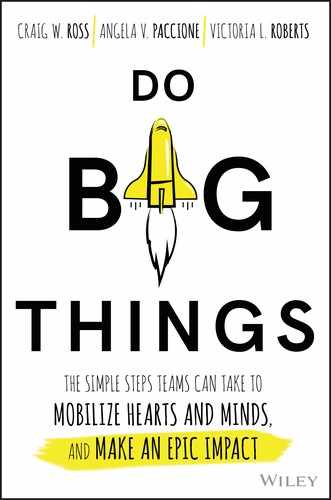CONTENTS
Teams that achieve significant outcomes distinguish themselves by taking seven essential steps. The Do Big Things Framework outlines the steps research shows teams must take to do anything extraordinary (without team members killing themselves in the process).
The needs of every business have changed, yet most teams in companies go about teaming the same way they did years ago. Organizations fail to realize their potential when teamwork is transactional and diminishes people. The end of teamwork (as we know it) is at hand.
3 Commit to the Human Imperative
The first step in the Do Big Things Framework is to identify and align team members to the human behaviors essential for delivering the business imperative. Often born from a sense of caring for one another, this is the transformative thinking in how team members perceive each other that sets the stage for values to be put into action.
4 Embody Success (and Leverage Failure)
Next, ensure the team personifies the spirit and experience of the success they seek while they pursue their lofty objectives. When excellence is who we are (rather than what we will be someday), then even the hardship we encounter in our journey makes us better and stronger as a team.
5 Choose to Contribute, Activate, and Connect Across the Business
Teams that do big things have team members who are equipped to make three specific decisions:
1. The Contributor Decision: I choose to bring my best to this situation.
2. The Activator Decision: I choose to bring out the best in others in every interaction.
3. The Connector Decision: We choose to partner across the business to deliver our shared objective.
6 Exercise Your Barrier-Breaking Authority
Determine what stands between the team and success—both real and perceived. Then enable the team to control what they can control, and move issues forward faster by acting upon their inherent authority to choose their response.
Use the 3 Mind Factors to concentrate on and deliver what causes big things to be achieved: the relationships and teamwork necessary to succeed.
8 Energize Around a Shared Reality
Use the Energy Map to make sure the team can tell the truth and function with authenticity. Effectively guide the focus and the common language essential to elevate how team members interact with one another. This step facilitates the needed skills of adaptability and accountability required to do big things.
9 Mobilize Hearts and Minds Forward
Empower the team to create and own their role in delivering a stronger future. Use Questions That Trigger Hearts and Minds so everyone internalizes and delivers the team’s business imperative.
10 Is Your Team Ready to Do Big Things?
Will the team overcome hidden forces in the culture that sabotage best efforts and destroy teams? Where does your team currently stand in its strength and ability to do big things? Answer these questions by using the simple Team Heart Quotient to assess how ready your team is to do big things.
